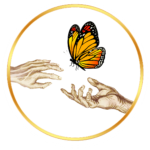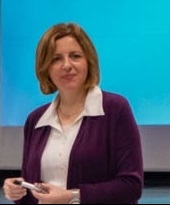Tagged: “Communities”
How can we keep forgiveness initiatives going in schools and social groups, such as correctional institutions?
I am discouraged. As I look at societies in this early part of the 21st century, I see far too much mayhem, too much outrageous injustice. Offenders rarely self-accuse; they rarely have a well-formed conscience and so they just do not learn that what they have done is dark and completely unacceptable. Therefore, forgiveness is not just a choice, but an absolute necessity. It is not the forgiveness itself that discourages me. What discourages me is this: the mayhem will continue and so the incessant need to forgive will continue. What insights do you have for me?
I think your discouragement is in the strong likelihood that the mayhem, as you call it, will continue in societies. Yet, let us engage in a thought experiment. Let us suppose that there never was such a moral virtue as forgiveness. The only moral virtues in this alternative universe are the quest for justice and the courage to carry this out. What, then, would individuals and families and communities be like? Would it not be the case that the vengeance, the hatred, and wars would be continuous? Would it not be the case that such wars would grow more violent, even more unjust? Would humanity ever discover love?
Now, compare the world I just created in this thought experiment with our current world. Yes, the injustices continue. Yes, we can address many of these with justice, but at the same time, we can add love to our interactions, at least within our own communities, so that the enmity, the hatred, and the toxic anger within people can be lessened and not passed on to the children. Our world has the potential for love, even though it is not always realized in actuality. What a world it would be if there was not even the potential for love. Forgiveness on its highest level is to exercise love. So, I hope that you have more hope now because love is real and available to all who have the wisdom to choose it.
Is forgiveness the same thing in all cultures and times?
We talk about forgiveness as if it has universal meaning, but should we be talking about early 21st Century forgiveness in Western cultures, rather than a generic “forgiveness?” Should we presume that forgiveness is not the same everywhere and across all time of human history?
Although there are wide cultural and religious differences among the Hawaiian family ritual of Ho-O-Pono-Pono, the discipline of forgiveness in the Jewish customs of Yom Kipper, and the sacrament of Penance within Catholicism, this does not mean that each is dissimilar at the core. The behaviors manifested in these three kinds of forgiveness differ, but all three are concerned about confronting injustice with love. All three acknowledge that there is right and wrong; all three acknowledge resentment or some kind of moral response to wrong; and all three see forgiveness as a merciful response of goodness toward the offender(s). At their core, these three seemingly disparate cultures and/or religions share much in common.
Across time, we have ancient stories of forgiveness that do not differ from the present day. In Hebrew writings, there is Joseph forgiving his brothers, and we see an unconditional, merciful response to their injustices against him. In Christian scripture, there is the father of the prodigal son offering him acceptance and love in the face of injustice. In Muslim writings there is a parallel story to Joseph, also showing mercy in the face of wrongdoing. Hindu, Buddhist, Confucian, and other ancient literature are more alike than different in describing what forgiveness is. The preserved meaning has not changed to this day.
Might we come across a culture that defines forgiveness very differently than those above? Might we come across a culture that condemns forgiveness as unnecessary or unimportant? Perhaps, but it seems just as likely to find a culture that de-values justice and honors cheating and lying and murder. No such culture to date has been found. While it is true that different cultures might give different examples of what constitutes a just action, all cultures honor just action.
Is forgiveness the same thing in all cultures and times? Despite wide cultural nuances, it appears to be so.
JOIN US! International Educational Conference on Agape Love and Forgiveness
A research project focusing on agape love and forgiveness, now underway in three culturally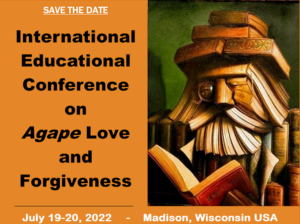 distinct areas of the world, will culminate next summer with an international educational conference to be held in Madison, Wisconsin. The conference will be hosted by the International Forgiveness Institute (IFI)—the nonprofit organization founded in Madison 27 years ago. The research is being conducted by researchers at the University of Wisconsin-Madison.
distinct areas of the world, will culminate next summer with an international educational conference to be held in Madison, Wisconsin. The conference will be hosted by the International Forgiveness Institute (IFI)—the nonprofit organization founded in Madison 27 years ago. The research is being conducted by researchers at the University of Wisconsin-Madison.
Working with elementary school children in Northern Ireland, Israel (both Arabic- and Hebrew-speaking schools), and Taiwan, the research is being funded by the John Templeton Foundation which has been supporting research on forgiveness for more than 20 years. The Foundation’s p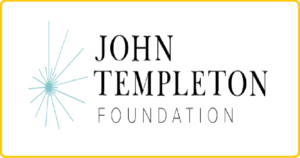 rimary goal is “to ignite a global conversation on forgiveness to help everyone experience its benefits and to increase the visibility and funding of forgiveness innovations.”
rimary goal is “to ignite a global conversation on forgiveness to help everyone experience its benefits and to increase the visibility and funding of forgiveness innovations.”
The 3-year project was developed by and is being conducted under the direction of Dr. Robert Enright, co-founder of the IFI and a professor of educational psychology at the University of Wisconsin-Madison. Its principal focus is on incorporating agape love fundamentals with Dr. Enright’s Forgiveness Curriculum materials for 5th grade students.
“Agape love is drawn from Greek tradition and is the highest expression of forgiveness toward those who caused pain,” Dr. Enright explains. “I call it the ultimate form of love—the kind of love that has never before been scientifically examined as part of forgiveness research.”
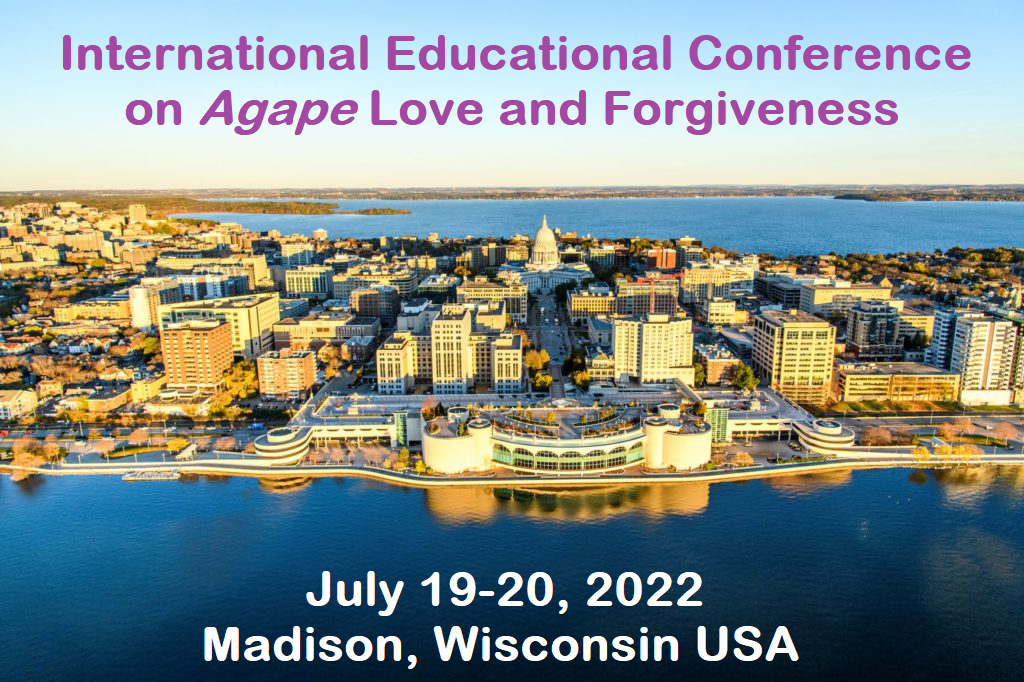 The research portion of the agape love and forgiveness education project will continue through most of this school year with 60 teachers and up to 1,200 students at the experimental sites. Some of those educators will outline their experiences and present their findings during the July 19-20, 2022 International Educational Conference on Agape Love and Forgiveness at the University of Wisconsin-Madison campus.
The research portion of the agape love and forgiveness education project will continue through most of this school year with 60 teachers and up to 1,200 students at the experimental sites. Some of those educators will outline their experiences and present their findings during the July 19-20, 2022 International Educational Conference on Agape Love and Forgiveness at the University of Wisconsin-Madison campus.
A new website that was created specifically for this Templeton Foundation project was recently launched with an abundance of information about agape love, forgiveness education, and the Conference. The website will serve as an ongoing platform where educators can access curricula and other teaching resources. It will also house all Conference presentations and education materials developed through the project. Visit the website: Agape Love and Forgiveness.
- Learn what agape love is and what makes it unique: Agape Love.
- Learn about the amazing benefits of Forgiveness Education.
Forgiveness Education in Greek Schools Now Includes How to Handle Trauma and Anger
More than 3,000 grade school students in Greece are learning how to reduce their anger, increase cooperation, gain resilience, and transform their traumas into personal character strengths through Forgiveness Education classes during this 2021-2022 school year.
“Trauma Transformation Through Forgiveness Education” is a social-emotional learning (SEL) program developed by Dr. Peli Galiti, Ph.D., M.Ed., research scholar at the University of Wisconsin – Madison. Dr. Galiti, a native of Athens, is also Director of the Greek Forgiveness Education Program (GFEP) started in 2014 by the Madison-based International Forgiveness Institute (IFI).
“This one-of-a-kind program is based on the educational research studies conducted by Dr. Robert Enright who pioneered the field of Forgiveness Education,” says Dr. Galiti. “His studies have demonstrated that Forgiveness Education classes help students reduce in anger and hostile attribution, increase in empathy, and actually result in improved grades.”
Dr. Enright is a UW-Madison educational psychology professor who co-founded the International Forgiveness Institute in 1994. He has developed comprehensive Forgiveness Education curricula for students in grades K-4 through 12th that are now being used in more than 30 countries around the world.
According to Dr. Galiti, the new program is actually a collaboration between the IFI, UW-Madison, and two Greek universities—the Aristotle University of Thessaloniki and the National and Kapodistrian University of Athens (where Dr. Galiti previously lectured). Funding is provided by the Athens-based Stavros Niarchos Foundation, one of the world’s leading private, international philanthropic organizations. The program also has the endorsement of the Greek Ministry of Education.
Dr. Galiti began implementation of the Trauma Transformation program last September by leading a series of Forgiveness Education workshops for 110 Greek teachers. Those teachers are delivering the forgiveness classes this semester at schools in four Greek cities–Athens, Larisa, Patra, and Thessaloniki.
That training focused on techniques and methods the teachers could use to help their students manage traumatic experiences and any personal or relational difficulties that might cause harm and pain. Thematic instructional units included:
- Forgiveness Education theory and principles.
- Why forgiveness is necessary and how it is applied in the school environment.
- Theories about trauma and its treatment.
- Transformation and wound healing through Forgiveness Education.
- Collaboration in the classroom and conflict resolution.
- The experience of Forgiveness Education in Greek schools: Best Practices and Case Studies.
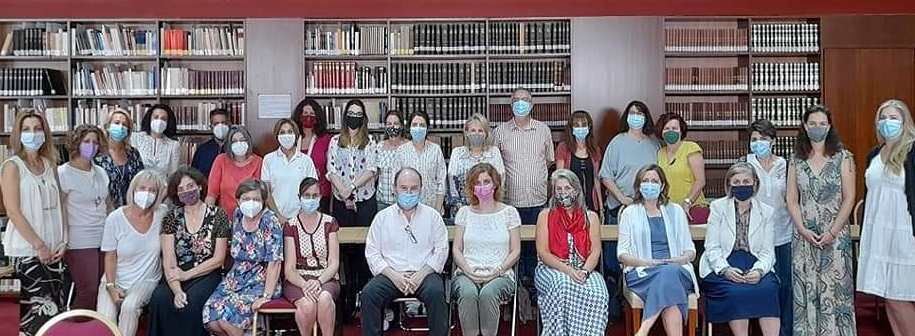
These grade school teachers in Athens were among the 110 teachers who received Forgiveness Education training conducted by Dr. Peli Galiti as part of the collaborative effort between the University of Wisconsin-Madison and the University of Thessaloniki.
The collaborative training efforts for this Forgiveness Education program have received support and major funding through the Greek Diaspora Fellowship Program that is designed to help avert Greece’s brain drain and develop long-term, mutually beneficial collaborations between universities in Greece, the United States, Canada, South Africa and Australia. The Fellowship Program is managed by the Institute of International Education in collaboration with the Fulbright Foundation in Greece, and funded by the Stavros Niarchos Foundation.
In 2017, Dr. Galiti was one of 30 Greek- and Cypriot-born scholars representing 28 prominent United States and Canadian universities who traveled to Greece to conduct academic projects with their peers at Greek universities as part of the Greek Diaspora Fellowship Program. As part of her fellowship, Dr. Galiti hosted workshops about Restorative Justice and Forgiveness Education, along with conducting research about bullying prevention and class collaboration.
- Visit the Greek Forgiveness Education Program website.
- Watch a 4 min. 12 sec. video about the Greek program: Learning to Forgive.
- Read more about Dr. Galiti’s eductional work in Greece.
- Watch a video webinar on Greek Forgiveness Education featuring presentations by Dr. Galiti and Dr. Enright.
About the Stavros Niarchos Foundation:
The Stavros Niarchos Foundation (SNF) (www.SNF.org), is one of the world’s leading private, international philanthropic organizations, making grants in the areas of arts and culture, education, health and sports, and social welfare. Since 1996, SNF has committed more than $3.3 billion through 5,100 grants to nonprofit organizations in 135 countries around the world.
The Foundation funds organizations and projects that are expected to achieve a broad, lasting and positive impact for society at large, and exhibit 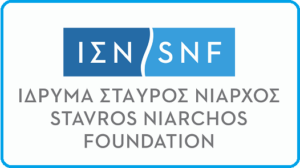 strong leadership and sound management. The Foundation also supports projects that facilitate the formation of public-private partnerships as an effective means for serving public welfare. In addition to its standard grants, the SNF has continued to respond to the urgent needs of Greek society, by providing relief against the severe effects of the socioeconomic crisis through three major grant initiatives of $378 million.
strong leadership and sound management. The Foundation also supports projects that facilitate the formation of public-private partnerships as an effective means for serving public welfare. In addition to its standard grants, the SNF has continued to respond to the urgent needs of Greek society, by providing relief against the severe effects of the socioeconomic crisis through three major grant initiatives of $378 million.

